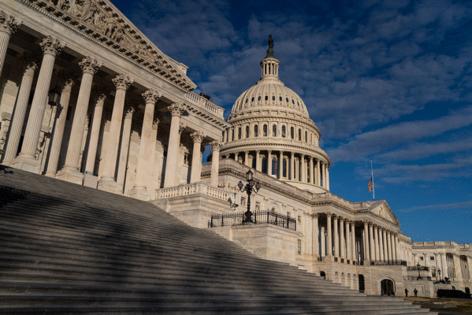GOP changes Senate rules to speed some confirmations
Published in News & Features
Senate Republicans voted Thursday to change the chamber’s rules to allow them to speed up the confirmation of lower-level Trump administration nominees, saying the move is necessary to combat a blockade from Democrats.
Despite last-minute talks between Democrats and Republicans to avert the so-called “nuclear” move, the chamber voted 53-45 along party lines to lower the votes needed to move forward with executive resolutions on floor consideration of lower-level nominees in groups. Previously it took 60 votes on a procedural motion, now it will take a simple majority.
The action happened around a measure that would authorize the en bloc consideration in executive session of dozens of those nominees.
For months, Democrats have forced the GOP majority to use valuable floor time on procedural votes, slowing down the confirmation process and leaving spots unfilled in the Trump administration.
The Thursday vote setting a new precedent came after Democrats and Republicans could not reach a bipartisan deal on changing the way the Senate handles the confirmation of nominees at the sub-Cabinet level.
In an animated floor speech, Senate Majority Leader John Thune, R-S.D., said Democrats would not even vote on one proposal that was less expansive than a past measure put forward by Democrats.
“How much time is enough? How much time is enough? The proposal that we are voting on — or want to vote on and just asked consent to get on — has been around for two years, introduced by Democrats,” Thune said.
He said it was an “embarrassment” that zero of Trump nominees in his second term had been confirmed by voice vote or unanimous consent.
“It’s time to move. Time to quit stalling. Time to vote. Time to fix this place,” Thune said.
Schumer: ‘Sad, regrettable’
Sen. James Lankford, R-Okla., said one proposal would have allowed 15 nominees to be considered on the floor en bloc. He said the idea had 60 votes in the Senate, with some Democrats backing the proposal.
“What we don’t have is consent to be able to actually bring it,” Lankford said.
Sen. Brian Schatz, D-Hawaii, said Lankford was asking for unanimous consent. “And we don’t have unanimous consent. We do not have unanimity,” Schatz said.
Republicans argue Democrats are destroying a Senate tradition of quickly confirming noncontroversial nominees regardless of the party of the president.
Democrats have used the process as a pressure point and contend the posture is needed as a negotiating tool, given that Trump has burned through government norms and at times embraced an authoritarian attitude of executive power.
Minority Leader Charles E. Schumer, in comments on the floor after the action, said it was a “sad, regrettable” day for the Senate and characterized the move as not so much about ending obstruction but “another act of genuflection to the executive branch.”
The rule change further weakened the Senate and turned the chamber “into a conveyor belt for unqualified Trump nominees,” the New York Democrat said.
Republicans have chipped away at the Senate even more, “to give Donald Trump more power and to rubber stamp whomever he wants, whenever he wants them, no questions asked,” Schumer said.
“That is not the Senate’s job. We’re supposed to debate and take votes on nominees, especially when the executive branch is grossly breaking norms by sending us woefully unqualified, unscrupulous and in some cases deeply dishonest individuals for powerful and important positions,” Schumer said.
“By going nuclear today, Republicans are saying, ‘We don’t want to do our jobs,’” Schumer said. “They’re saying, ‘Whatever Trump wants, we’ll do it.’”
Earlier in the year, Schatz said he was putting a blanket hold on all Trump administration State Department nominees over the shuttering of the U.S. Agency for International Development.
In May, Schumer announced a hold on all Justice Department nominees after the administration agreed to accept a plane from Qatar. That move from Schumer prevented U.S. attorney nominees from moving forward on voice votes.
Senators have been squaring off over the status of U.S. attorney nominees for months.
U.S. attorneys act as the chief federal law enforcement officers in individual districts nationwide and oversee offices that prosecute federal crimes in those areas.
Traditionally, those nominees have been noncontroversial and often fast-tracked through floor confirmation.
Democrats say it was Vice President JD Vance who broke the tradition of quickly confirming those nominees during his time as a junior senator from Ohio.
©2025 CQ-Roll Call, Inc., All Rights Reserved. Visit cqrollcall.com. Distributed by Tribune Content Agency, LLC.







Comments